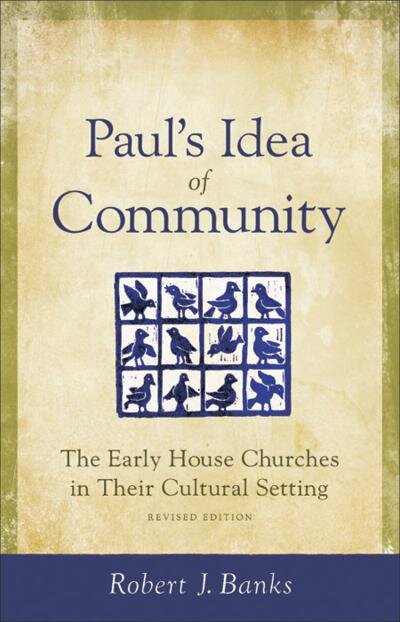Robert J. Banks, Paul’s Idea of Community: The Early House Churches in Their Cultural Setting, Revised Edition. Baker Academic, 1994.
Referenced in: Ecclesiologies
LifeandLeadership.com Summary
This is a standard reference on the theology of church as a community, especially as it expressed itself in the house churches in the first century, as described in the letters of Paul (though he minimizes the Pastorals). Banks argument may be summarized in three points.
First, the freedom Christians enjoy makes them independent from sin, Law, death, alien powers, etc. and to a life-giving liberty to enjoy righteousness and the life of Christ; dependent on Christ and the Spirit for our delivery from sin’s enslavement and entry into Christ’s life; and interdependent with others in a life of service and with the world in a kind of solidarity based on the hope of transformation.
Second, the social and religious backgrounds in which the early Christian communities emerged helps us to distinguish the “ekklesia” from the religious communities of Judaism and Hellenistic “mystery cults.” Paul used “ekklesia” to refer exclusively to a “regular, local gathering before God,” meeting at homes in smaller groups of 30 or less (32-34). Banks goes so far as to dismiss the idea of the invisible, universal church by suggesting Paul envisioned a “heavenly assembly within which we are already participating and whose culmination will take place on the Last Day,” (40). He says Christians belong both to a heavenly church that is permanently in session and to a local church that, though it meets regularly, is intermittent in character. This means Christians are in a common relationship with Christ not only when they meet together—nor, for that matter, when they individually relate to him in thought and prayer—but at all times, wherever they are and whatever they do. (41)
Third, the early communities had no confessions, codes, liturgical orders, clerical structures, denominational authority, institutional leadership, or larger organizational unity. There was an “apparent absence of all institutional means of support.” He also reinterprets church leadership roles such as elder and deacon as tasks to which people were appointed as needed.
This means that the focal point of reference for Paul’s community is neither a book [vs. Protestantism’s emphasis on the Bible] nor a rite [vs. Anglican and Catholic emphasis on the Eucharist], neither a code nor a cult, but a set of relationships. God primarily communicates to them, not through the written word and tradition or mystical experience and cultic activity, but through one another. (108)
With all of its value with regard to backgrounds (a good feature of the book), many may experience Banks as lacking thoroughness and prone to overstatement. Even if what Banks says is true, he regards Paul’s theology of the “ekklesia” as progressive (i.e. growing as early Christians experienced it in the progression of the mission) and not systematic. This leaves room for the idea of “ekklesia” to progress into more institutional forms. As it is, however, his scope of inquiry is limited to Paul, and only some of Paul, dismissing the Pastorals. Perhaps a richer meaning of “ekklesia” may be found in the full wealth of the New Testament.
From the Publisher
Robert Bank’s widely read Paul’s Idea of Community: The Early House Churches in their Cultural Setting is once again available to laypeople, pastors and scholars alike. In this extensively revised edition Banks has rewritten chapters for clarity, taken into account recent scholarship on Paul’s writings, updated and expanded the bibliography, and added an index. This new edition retains, however, all the freshness and vitality of the original.
About the Author
Robert Banks (PhD, University of Cambridge) is director and dean of Macquarie Christian Studies Institute in Sydney, Australia. Previously he was founding professor of the ministry of the laity at Fuller Theological Seminary in Pasadena, California, and executive director of the De Pree Leadership Center.
***For additional information on this resource, including reviews, click the bookstore links. Check the reference at page top or the links below for resource guides on related topics.***
Related Areas
See Other Resources on Theology of Mission and Ministry:
See Other Resources on Church Leadership and Renewal:
- Church Leadership and Renewal, Index
- Church Leadership, Theological Foundations, Ecclesiology
- Church Leadership, Philosophical Foundations – e.g. Church Growth, Missional, Emergent, and Other Missionally Responsive Trajectories
- Church Leadership, Practical Foundations – Church Dynamics and Research
- Church Leadership, Practical Foundations – Congregational Culture, Church Identity
- Church Leadership, Practical Foundations – Size Dynamics, Size Transitions
- Church Leadership, Practical Foundations – Research and Case Studies on Effective Churches
- Church Leadership, Special Situations – Small Church Development
- Church Leadership, Strategies for Renewal
See Resources on Over 100 Areas of Ministry Leadership:


